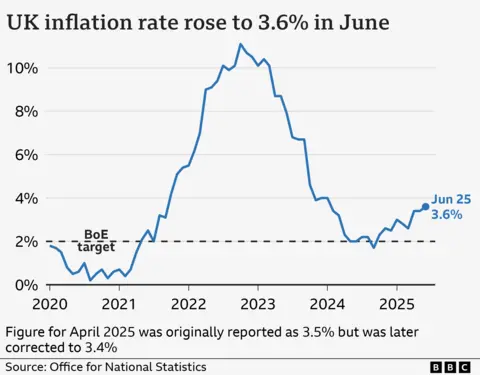JULY 16 – Prices rose by greater than anticipated within the 12 months to June, pushing inflation to three.6%, the best it has been since January 2024.
Higher costs for meals and clothes, air and rail fares – and a decrease drop in gasoline costs than this time final 12 months – contributed to larger inflation, official figures present.
The charge at which costs enhance issues to consumers, whose cash doesn’t go as far if items and providers have gotten quickly dearer.
Inflation stays a lot larger than the Bank of England’s goal charge of two%, however a minimize in the price of borrowing continues to be anticipated at subsequent month’s rate-setting assembly.
The tempo of value rises impacts whether or not the Bank decides to boost or decrease rates of interest as larger charges can sluggish inflation by dampening financial exercise.
The larger determine for June was surprising, with economists having predicted the inflation charge would keep on the 3.4% it hit in April and May.
Yael Selfin, chief economist at KPMG UK, mentioned persistent underlying pressures, together with tax rises in April, meant inflation was more likely to peak at 4% within the autumn.

Richard Heys, appearing chief economist for the Office for National Statistics (ONS) mentioned the biggest contribution to June’s larger inflation got here from transport.
While petrol and diesel are inexpensive than they had been a 12 months in the past, the value fell solely barely between May and June this 12 months, in comparison with a bigger fall in the identical month final 12 months.
Airfares, which may be unstable, had been larger, particularly long-haul and European routes, the ONS mentioned.
The rise in rail fares got here from dearer tickets on worldwide routes.
Table of Contents
‘Groceries add up’
Average wages have risen over the previous 12 months, by 5.2%, suggesting many individuals won’t be worse off total, however consumers, notably these on low incomes, are extra affected by larger costs for every day staples corresponding to meals and petrol.
Alissia Mardlin, a bartender from London, mentioned her lease in a shared flat was “extortionate” leaving her with little spare spending cash.
“I eat sweetcorn and pasta,” she mentioned, blaming the upper price of dwelling.
Private rents elevated by 6.7% within the 12 months to May, in line with figures revealed by the ONS on Wednesday, a barely slower tempo than a month earlier.
House costs picked up once more, rising by 3.9%.
Jonathan Ballantyne, a advertising supervisor from Bishop’s Stortford, instructed the BBC he had not observed a lot change in his grocery store store however was noticing a squeeze on petrol and power prices.
“I’m extra acutely aware of not driving locations as a result of I’m considering what’s it going to be costing,” he mentioned.
Saul, who didn’t wish to share his surname, mentioned he had observed espresso and beer getting dearer, making individuals much less more likely to exit and socialise.
“Groceries add up massively,” he mentioned. “Meal offers in supermarkets have gone up massively – they’ve elevated by 50p since I can bear in mind.”

Food costs rose at a charge of 4.5% within the 12 months to June, the best charge since February 2024 however properly beneath the height seen two years in the past.
Food business representatives mentioned producers had been dealing with larger prices for key substances – corresponding to chocolate, butter, espresso and meat – in addition to larger power and labour prices.
Bad for savers
The larger inflation determine follows information final week that the economy shrank unexpectedly in May.
Chancellor Rachel Reeves mentioned she knew individuals had been “nonetheless battling the price of dwelling” however mentioned the federal government’s plans included placing “extra money into individuals’s pockets”.
In her annual Mansion House speech on Tuesday, the chancellor emphasised the significance of development to placing the UK again on observe.
She mentioned the monetary business it should change the “adverse” narrative round savers placing cash in shares and shares.
Caitlyn Eastell, spokesperson for the non-public finance publication, Moneyfactscompare.co.uk mentioned larger inflation was doubtlessly “unhealthy information” for individuals’s wealth, as it’s larger than the typical return on financial savings accounts.
She suggested them to “store round” for one of the best financial savings returns.
Interest charges for savers might fall additional if the Bank of England cuts borrowing prices as anticipated in August.
However, Andrew Sentance, a former member of the committee which units rates of interest, mentioned on social media he believed it could be “irresponsible” to chop charges with inflation rising.
Other commentators, together with KPMG’s Selfin, anticipate the upper charge to “reinforce the Bank of England’s cautious method”.
Inflation at the moment stays properly beneath the peaks it reached after Russia’s invasion of Ukraine, when larger power costs pushed up prices throughout the board. In October 2022, it reached 11.1%.
By BBC




